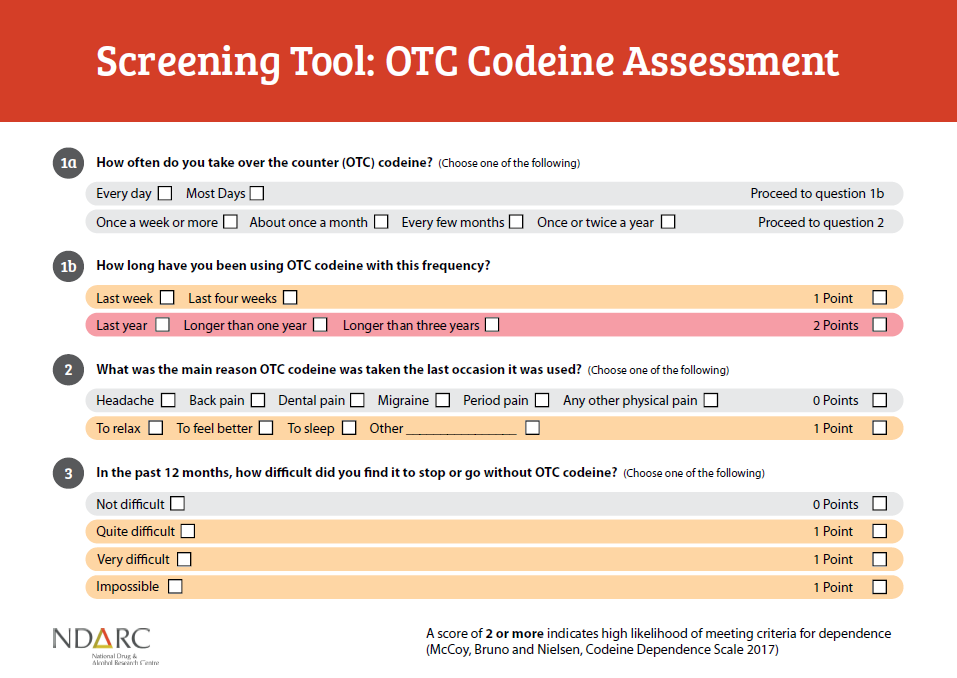
Opioids
As of the 1st of February 2018, all medicines containing codeine have become prescription only. Research has shown that over-the counter low-dose (<30mg) medicines containing codeine offer small pain relief treatment when compared to medicines without codeine. Use of codeine can cause opioid tolerance, dependence, poisoning and in high doses, death. Regular use of codeine for pain relief has resulted in some consumers becoming opioid dependent without realising.
GP and Practice Nurses
Advice for Medical Professionals
Northern Sydney Drug and Alcohol Service Ph: 1300 889 788. 8.30am – 5pm
Drug and Alcohol Specialist Advisory Service (DASAS) Ph. 9361 8006 (Sydney Metro) 24/7
Definition of Substance Use Disorders
Refer to the DSM 5 or The ICD 10 Classification of Mental and Behavioural Disorders, (pp. 65 – 75).
Fact Sheets: Changes to disorders in the DSM-5. See Updated Disorders – Substance-Related Addictive Disorders. American Psychiatric Association.
Comparison of DSM-IV, DSM-5, and NSDUH Substance Use Disorder Assessment, Table 2.1. National Centre for Biotechnology Information (NCBI) USA.
Educational Videos and Webinars
Created by a collective of addiction specialists in Australia, a series of educational videos have been produced to assist GPs to identify drug seeking and dependent patients, understand their current abuse of drugs, how to say no, guidance for referring patients to opioid substitution programs and more.
GPs will be introduced to new guidelines that allow prescribing of Schedule 8 medications without further training in Opioid Substitution Treatment.
RACGP Webinar: Opioid Treatment in General Practice: Assessing for dependency and understanding treatment options. This webinar supports GPs to manage patients who are having issues with pharmaceutical opioids.
The NSW Opioid Treatment Program
The NSW Opioid Treatment Program (OTP) aims to reduce harms associated with opioid use through the use of Opioid Substitution Therapy (OST) with either methadone or buprenorphine. Authorisation from the Ministry of Health is required to enrol a patient on the NSW OTP.
Accredited OTP Prescribers
The Opioid Treatment Accreditation Course (OTAC) enables GPs to gain the knowledge, skills and practices to safely prescribe opioid pharmacotherapies in NSW and enrol patients on the OTP.
To become an accredited OTP prescriber for up to 200 patients, GPs must complete the OTAC which is comprised of two free courses;
- Fundamentals of Training – a short on-line course and on completion;
- A comprehensive one-day face-to-face course with an examination and complete a brief clinical attachment
For more information contact the OTAC course provider, the University of Sydney Discipline of Addiction Medicine, by email otac.info@sydney.edu.au or phone 9515 9811.
Unaccredited Medical Practitioners
Application for authority to prescribe methadone or buprenorphine under the NSW Opioid Treatment Program (OTP). Click for Application Form.
- Methadone: Unaccredited medical practitioners may apply to the Pharmaceutical Regulatory Unit (PRU) for an individual patient authority to prescribe for up to ten (10) low-risk patients who are being transferred from an accredited prescriber. Unaccredited medical practitioners should engage with the previous accredited prescriber or seek advice from the Drug and Alcohol Specialist Advisory Service (DASAS) if significant changes to treatment are required or the patient’s risk assessment changes adversely.
- Buprenorphine and buprenorphine-naloxone: Unaccredited medical practitioners may apply to the PRU for individual patient authority to initiate patients with buprenorphine or buprenorphine-naloxone. Unaccredited prescribers may be authorised for up to 20 buprenorphine-naloxone patients.
To clarify, the total number of patients that an unaccredited prescriber may obtain authority to prescribe for, at any one time, is thirty (30) with a maximum of 10 of these patients being for methadone.
New Opioid Treatment Guidelines
- Abbreviated Guidelines
- Full Guidelines
- Key Differences between the 2006 OTP guidelines and the 2018 OTP guidelines
- Additional points to note OTP Guidelines 2018
Useful Resources
- Managing opioid dependence in pregnancy: A general practice perspective provides an overview of treatment principles for managing opioid dependence in pregnancy, and reviews current treatment guidelines for use of opioid-substitution therapy in pregnant women.
- RACGP – Prescribing Drugs of Dependence in General practice – Benzodiazepines
- RACGP – Prescribing Drugs of Dependence in General Practice- Opioids
- Responding to Pharmaceutical Opioid-Related Problems: A Resource for Prescribers


TGA’s Codeine Hub
The Therapeutic Goods Association (TGA) has developed a Codeine Hub that contains education resources including factsheets and conversational tips for managing patients.
- Professor John Skerritt & Avi Rebera – Changes to codeine product access: Background to the decision to change to prescription-only
- Pene Wood – Alternative options to codeine in the pharmacy
- Dr Malcolm Hogg – Rethinking our approach to pain and the role of opioid therapy
- Dr Mathew Frei – Over the counter, down the hatch: OTC codeine use
- Dr Malcolm Hogg – Delivering pain management in a rural setting
- Panel Q&A Session – Codeine Up-scheduling Workshop
Person Centred Language
Person-centred language focuses on the person, not their substance use. It is a simple and effective way of showing you respect a person’s agency, dignity and worth.
The Pharmaceutical Society of Australia (PSA) has developed online training to assist pharmacists to prepare for the re-scheduling. Modules and their expiry dates below:
- Managing the transition to Prescription Only codeine – expires 30/9/19
- A patient focused clinical overview of pain – expires 30/9/19
- Transforming your business – expires 16/11/19
- Principles of pain management – expires 29/11/19
- Pain management in practice – expires 29/11/19
- Communication in pain management – expires 20/12/19
TGA’s Codeine Hub
The Therapeutic Goods Association (TGA) has developed a Codeine Hub that contains education resources including factsheets and conversational tips for managing patients.
- Professor John Skerritt & Avi Rebera – Changes to codeine product access: Background to the decision to change to prescription-only
- Pene Wood – Alternative options to codeine in the pharmacy
- Dr Malcolm Hogg – Rethinking our approach to pain and the role of opioid therapy
- Dr Mathew Frei – Over the counter, down the hatch: OTC codeine use
- Dr Malcolm Hogg – Delivering pain management in a rural setting
- Panel Q&A Session – Codeine Up-scheduling Workshop
Scriptwise have developed resources to support pharmacists to discuss alternative options for chronic and acute pain.
NPS MedicineWise
NPS MedicineWise have created patient, pharmacist and GP resources. The website contains several patient stories and factsheets in multiple languages.
Person Centred Language
Person-centred language focuses on the person, not their substance use. It is a simple and effective way of showing you respect a person’s agency, dignity and worth.
Consumer Information
As of the 1st of February 2018, all medicines containing codeine have become prescription only. Research has shown that over-the counter low-dose (<30mg) medicines containing codeine offer small pain relief treatment when compared to medicines without codeine. Use of codeine can cause opioid tolerance, dependence, poisoning and in high doses, death. Regular use of codeine for pain relief has resulted in some consumers becoming opioid dependent without realising.
The Australian Government Codeine Information Hub contains information about changes to patient access for medicines containing codeine. This includes where to get advice, how codeine affects the body, the harms of codeine and answers to frequently asked questions. If you are concerned that you may have a codeine dependency, please consider speaking to a pharmacist or GP.
The Codeine Information Hub also contains resources from NPS MedicineWise on pain management.
- Information on living with and managing chronic pain
- Tips for talking to your health professional, including a communication tool
- Other Useful links and resources for managing pain
- Managing Chronic pain video Dr Malcolm Hogg, Head of Pain Management Services, Royal Melbourne Hospital
- FAQs about chronic pain
Local Counselling Services
Northern Sydney Local Health District provide counselling services across a variety of locations in Northern Sydney
SDECC – AOD Intensive Support Program
Non-residential day rehabilitation, including individual counselling, care coordination, group programs and intensive outreach for people aged 14-25 years Services are available in Chatswood and Manly.
To access the program call 9977 0711.
Odyssey House Community Services
Non-residential rehabilitation for adults over 18 years old, including individual and group counselling, support to family members of people who have an addiction. Services available in Chatswood and Manly. To access the program call 1800 397 739.
Odyssey House Community Services – Drug & Alcohol Counselling
Non-residential day rehabilitation for Aboriginal and Torres Strait Islander adults over 18 years old, including individual and group counselling, support to family members of people who have an addiction. Services available in Chatswood and Manly. To access the program call 1800 397 739.
ACON – Substance Support Counselling
Face-to-face in Surry Hills and remote access program (Skype or telephone) providing intensive, structured interventions within a harm reduction model to Lesbian, Gay, Transgender and Intersex people with alcohol and other drug misuse issues. Up to 12 sessions with the ability to extend. To access the program call 1800 063 060.



